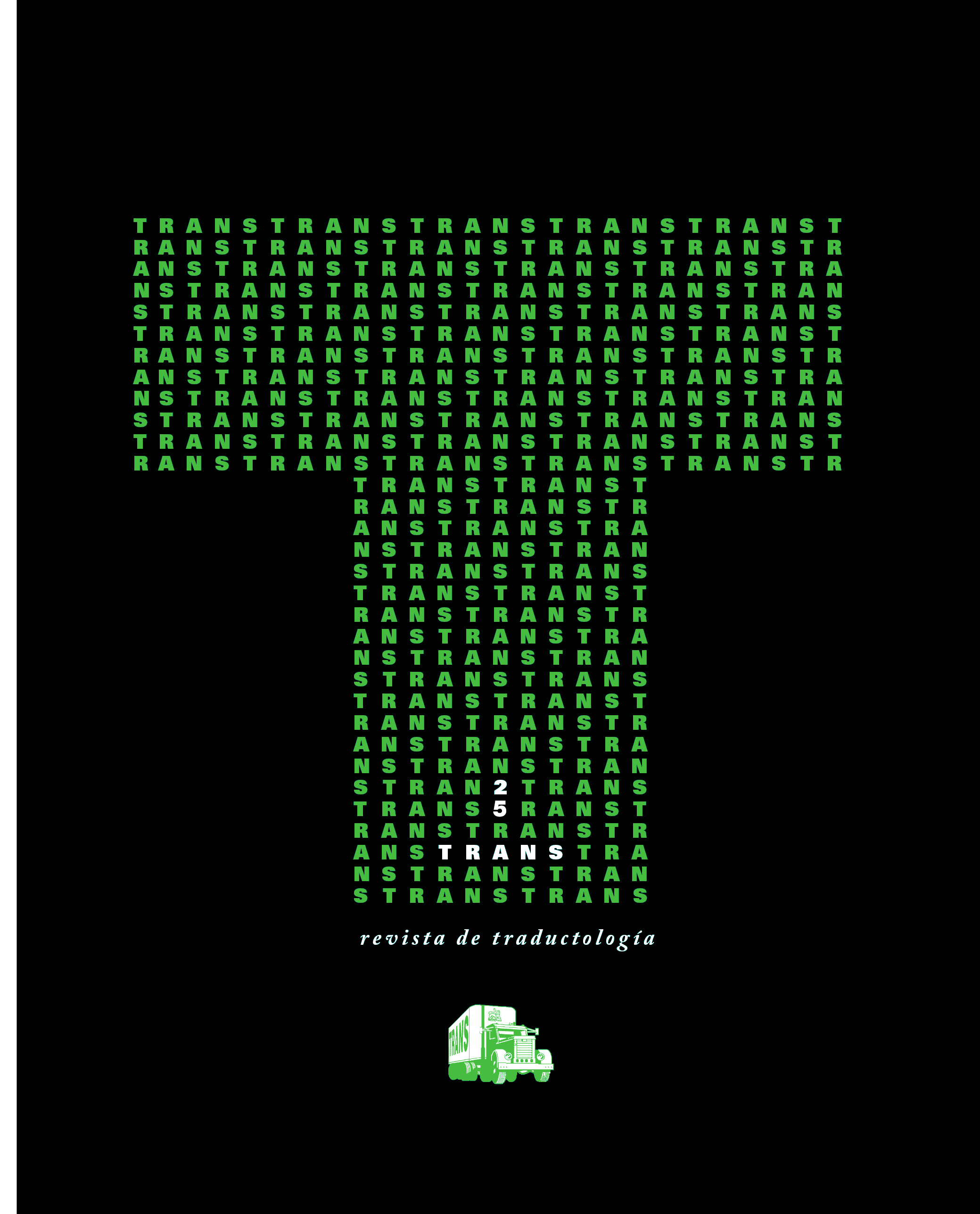Facing Chapter Titles in Chinese Classical Novels: an analysis and a comparison of the Chinese-Spanish translations of Journey to the West
DOI:
https://doi.org/10.24310/TRANS.2021.v1i25.10659Keywords:
Journey to the West, literary translation, corpus, titles, Chinese-SpanishAbstract
In this research, we have studied the headings of the one hundred chapters of Journey to the West, and two of its translations in Spanish. By building up a corpus with these texts, we analyzed the main features and the differences among them -in particular, at the syntactic, semantic, and lexical/terminological levels-, as well as the different ways in which linguists translated the original text, and the resources they used to carry out their task. Likewise, we confirm the difficulty of translating into Castilian a book written in Mandarin Chinese, and the loss of relevant information during the translation process, due to the difficulty of keeping the style, the rhythm, capturing the cross-cultural aspects in Spanish, and of translating correctly the terminological items of the eastern religions.
Downloads
Metrics
Publication Facts
Reviewer profiles N/A
Author statements
Indexed in
-
—
- Academic society
- N/A
- Publisher
- Universidad de Málaga
References
ANÓNIMO (2006): Viaje al Oeste: las aventuras del Rey Mono, trad. E. P. Gatón y I. Huang-Wang, Madrid: Ed. Siruela.
BAKER, Mona (2000): «Towards a Methodology for Investigating the Style of a Literary Translator», Target, 12/2, 241-266.
BAKER, Mona (1993): «Corpus Linguistics and Translation Studies—Implications and Applications» en Text and Technology: In Honor of John Sinclair, BAKER et al. (eds.). Amsterdam & Philadelphia: John Benjamins: 233-250.
BAKER, Mona (ed.) (1998): The Routledge Encyclopedia of Translation Studies, London/New York: Routledge.
BAKER, Mona (1989): «Object sharing and projection in serial verb constructions», Linguistic Inquiry, 20, 513-553.
CORPAS PASTOR, Gloria (2008): Investigar con corpus en traducción: los retos de un nuevo paradigma, Franckfurt: Peter Lang.
GARCÍA YEBRA, Valentín (1997): «La voz pasiva francesa y su traducción al español», Thélème. Revista Compultense de Estudios Franceses, 11, 347.
GILI GAYA, Samuel (1961): Curso superior de sintaxis española. Barcelona: Biblograf.
GUO, Mingzhi (1997): «Daogui yu xiyoujirenwude bieming daichen» («Daogui y los alias y nombres metonímicos en Viaje al Oeste»), Seeking Truth, 2, 64-69.
HALLIDAY, M. A. K. (1976): An Introduction to Functional Grammar, London: Edward Arnold.
HERNANDO CUADRADO, Luis Alberto (2005): «El orden de palabras en español», Revista de filología, 23, 161-178.
HU, Sheng (2003): Xiyouji cidian (Diccionario del Viaje al Oeste), Shenyang: Liaohai.
LAVIOSA, Sara (2002): Corpus-Based Translation Studies: Theory, Findings, Applications, Amsterdam: Rodopi.
LI, Xiaolong (2012): Zhonguo gudianxiaoshuo huimu yanjiu (Estudios sobre los títulos de capítulo de las novelas clásicas chinas), Pekín: Peking University Press.
LIU, Junbo (2018): «Yijiu kuiren youyanlai—zhanghuitixiaoshuode shijuhua biange» («Las golondrinas siempre volverán: revolución de las formas poéticas de los títulos de capítulos en las novelas clásicas chinas»), Tangdu Journal, 34/6, 78-84.
MCENERY, Tony y Andrew HARDIE (2012): Corpus Linguistics: Method, Theory and Practice, Cambridge: Cambridge University Press.
MUNDAY, Jeremy (2001): Introducing Translation Studies: Theories and Applications, London/New York: Routledge.
NEWMARK, Peter (2002): A Textbook of Translation, Shanghai: Shanghai Foreign Language Education Press.
NIDA, Eugene A. (2017): Language and Culture. Contexts in Translating, Shanghai: Shanghai Foreign Language Education Press.
BAKER, Mona (2014): Diccionario de la lengua española, Madrid: Espasa.
BAKER, Mona (1999): Ortografía de la lengua española, Madrid: Espasa.
TOGNINI-BONELLI, Elena (2001): Corpus Linguistics at Work, Amsterdam, Benjamins.
VENUTI, Lawrence (1995): The Translator’s Invisibility: A History of Translation. Londres: Routledge.
WANG, Li. (2014): Zhongguo xiandai yufa (Gramática de chino moderno), Beijing: Zhonghua Press.
WU, Cheng’en (2010): Peregrinación al Oeste, trad. M. Lacea y C. Trigoso, Beijing: Ediciones en Lenguas Extranjeras.
ZHANG, Pingren (2009): «Xiyouji wuxing sixiang pingxi» («Crítica de los pensamientos de cinco elementos en Viaje al oeste»), The Jounal of Ming-Qing Fiction Studies, 91, 91-94.
ZHENG, Zhenduo (2012): Zhongguo suwenxue shi (Historia de la literatura vulgar de China), Beijing: Oriental.
ZHONG, Zhaopeng (2001): Daojiao xiaocidian (Diccionario del Taoísmo), Shanghai: Shanghai Lexicographic Publishing House.
Downloads
Published
How to Cite
Issue
Section
License
All contents published in TRANS. Revista de Traductología are protected under the Creative Commons Attribution-NonCommercial-ShareAlike 4.0 International (CC BY-NC-SA 4.0) license. All about this license is available in the following link: <http://creativecommons.org/licenses/by-nc-sa/4.0>
Users can copy, use, redistribute, share and exhibit publicly as long as:
- The original source and authorship of the material are cited (Journal, Publisher and URL of the work).
- It is not used for comercial purposes.
- The existence of the license and its especifications are mentioned.
- ShareAlike — If you remix, transform, or build upon the material, you must distribute your contributions under the same license as the original.
There are two sets of authors’ rights: moral and property rights. Moral rights are perpetual prerogatives, unrenounceable, not-transferable, unalienable, imprescriptible and inembargable. According to authors’ rights legislation, TRANS. Revista de Traductología recognizes and respects authors moral rights, as well as the ownership of property rights, which will be transferred to University of Malaga in open access.
The property rights are referred to the benefits that are gained by the use or the dissemination of works. TRANS. Revista de Traductología is published in an open access form and it is exclusively licenced by any means for doing or authorising distribution, dissemination, reproduction, , adaptation, translation or arrangement of works.
Authors are responsable for obtaining the necessary permission to use copyrighted images.













21.png)
